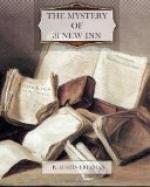“How came he to be a civil-service pensioner at fifty-five?” asked Thorndyke.
“Oh, that was through an accident. He had a nasty fall from a horse, and, being a rather nervous man, the shock was very severe. For some time after he was a complete wreck. But the failure of his eyesight was the actual cause of his retirement. It seems that the fall damaged his eyes in some way; in fact he practically lost the sight of one—the right—from that moment; and, as that had been his good eye, the accident left his vision very much impaired. So that he was at first given sick leave and then allowed to retire on a pension.”
Thorndyke noted these particulars and then said:
“Your uncle has been more than once referred to as a man of studious habits. Does that mean that he pursued any particular branch of learning?”
“Yes. He was an enthusiastic Oriental scholar. His official duties had taken him at one time to Yokohama and Tokio and at another to Bagdad, and while at those places he gave a good deal of attention to the languages, literature and arts of the countries. He was also greatly interested in Babylonian and Assyrian archaeology, and I believe he assisted for some time in the excavations at Birs Nimroud.”
“Indeed!” said Thorndyke. “This is very interesting. I had no idea that he was a man of such considerable attainments. The facts mentioned by Mr. Marchmont would hardly have led one to think of him as what he seems to have been: a scholar of some distinction.”
“I don’t know that Mr. Marchmont realized the fact himself,” said Stephen; “or that he would have considered it of any moment if he had. Nor, as far as that goes, do I. But, of course, I have no experience of legal matters.”
“You can never tell beforehand,” said Thorndyke, “what facts may turn out to be of moment, so that it is best to collect all you can get. By the way, were you aware that your uncle was an opium-smoker?”
“No, I was not. I knew that he had an opium-pipe which he brought with him when he came home from Japan; but I thought it was only a curio. I remember him telling me that he once tried a few puffs at an opium-pipe and found it rather pleasant, though it gave him a headache. But I had no idea he had contracted the habit; in fact, I may say that I was utterly astonished when the fact came out at the inquest.”
Thorndyke made a note of this answer, too, and said:
“I think that is all I have to ask you about your uncle Jeffrey. And now as to Mr. John Blackmore. What sort of man is he?”
“I am afraid I can’t tell you very much about him. Until I saw him at the inquest, I had not met him since I was a boy. But he is a very different kind of man from Uncle Jeffrey; different in appearance and different in character.”
“You would say that the two brothers were physically quite unlike, then?”




